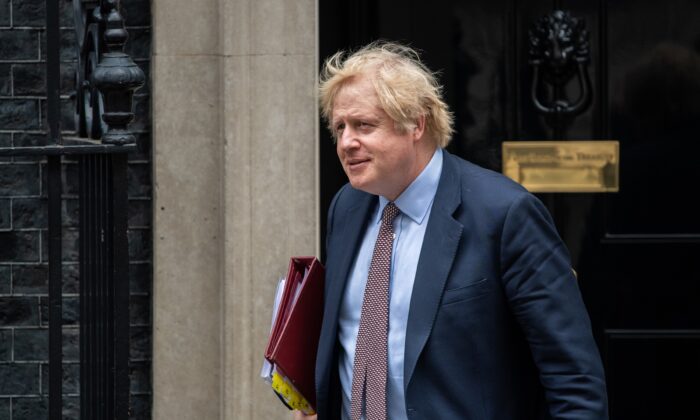LONDON—Prime Minister Boris Johnson acknowledged June 29 that the coronavirus pandemic has been a “disaster” for Britain, as he announced a spending splurge designed to get the country—and his faltering Conservative government—back on track.
As the UK emerges from a three-month lockdown, Johnson has lined up big-money pledges on schools, housing, and infrastructure, in an attempt to move on from an outbreak that has left more than 43,000 Britons dead—the worst confirmed death toll in Europe.
“This has been a disaster,” Johnson said. “Let’s not mince our words. I mean, this has been an absolute nightmare for the country, and the country’s gone through a profound shock.
“But in those moments, you have the opportunity to change and to do things better,” he told Times Radio. “This is a moment now to give our country the skills, the infrastructure, the long-term investment that we need.”
Johnson promised a “Rooseveltian approach,” invoking the New Deal policies of President Franklin D. Roosevelt that helped wrench the United States out of the Great Depression. Johnson’s first announcement was 1 billion pounds ($1.25 billion) to build new schools. The British leader plans to unveil a series of other infrastructure projects this week.
Johnson won a large majority in Parliament in December with a promise to rebalance Britain’s London-dominated economy and revive the long-neglected former industrial regions of central and northern England.
Those plans were thrown into turmoil by COVID-19. The UK’s official death toll stood on June 29 at 43,575, the third-highest in the world after the United States and Brazil, and the true figure is likely higher.
“What we’re going to be doing in the next few months, is really doubling down on our initial agenda, which was all about investment … in infrastructure, in education, in technology, to bring the country together,” he said.
Critics want to know where the money will come from. The economic freeze caused by the pandemic has left Britain facing a deep recession—the Bank of England estimates that the U.K. economy could end the first half of 2020 around 20 percent smaller than at the start of the year.
The UK faces another economic shock at the end of this year when a post-Brexit transition period ends, casting the country out of the 27-nation bloc’s vast single market.
Talks with the EU on a new trade deal have bogged down amid wide differences on major issues including fishing rights and competition. If no agreement is struck by the end of the year, the UK faces tariffs and other barriers to business with the EU, its biggest trading partner.
Despite the gloomy economic outlook, Johnson said it would be “a mistake” to return to the austerity of previous Conservative governments, which since 2010 have cut public spending in an attempt to lower a national debt that was swollen by the 2008 global financial crisis.
Despite his attempts to turn the page, Johnson, who was hospitalized in intensive care with the coronavirus in April, will likely face a reckoning over his government’s handling of the outbreak.
Critics accuse the government of being too slow to impose a nationwide lockdown, of failing to get enough protective equipment to medical workers and of botching the launch of a test-and-trace system to control new outbreaks.
Deaths and new infections are now declining, but slowly, and Britain lags behind its European neighbors in reopening society and the economy.
In another sign of Johnson’s attempt to regain control, Britain’s top civil servant announced late June 29 he was stepping down. Mark Sedwill is leaving his twin jobs as head of the civil service and national security adviser after reports of disagreements with Johnson’s powerful chief adviser, Dominic Cummings.
Johnson has named David Frost, the government’s EU trade negotiator, to the national security post. The appointment has raised some eyebrows because Frost is a political appointee, rather than a neutral civil servant.
Gus O’Donnell, a former UK civil service chief, said political appointees, “are more likely to be subject to group-think, more likely to be yes-men, more likely to say what it is ministers want to hear as opposed to giving good, objective, speaking truth to power which is what it’s all about.”
Opposition Labour Party leader Keir Starmer said it was “obvious that the prime minister wanted to move (Sedwill) and was determined to do so.”
“Why you do so in the middle of a pandemic and a crisis instead of actually focusing on the crisis, is a question the prime minister needs to answer,” he said.
By Jill Lawless
Focus News: COVID-19 Has Been a Disaster for Britain, PM Johnson Says
China’s Factory Activity Likely Slowed in June on Subdued Global Demand
